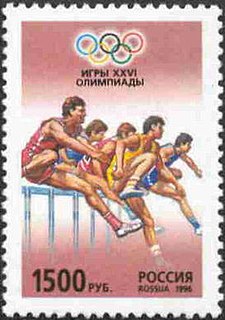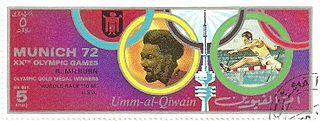
William "Bill" Franklin Porter III was an American track and field athlete, gold medal winner of the 110-meter hurdles at the 1948 Summer Olympics.

The men's 110 metres hurdles was the shorter of two hurdling events at the 1908 Summer Olympics in London. It was dominated by the American runners. The competition was held from Thursday, July 23, 1908, to Saturday, July 25, 1908. 25 hurdlers from ten nations competed. NOCs could enter up to 12 athletes. The event was won by Forrest Smithson of the United States, the fourth of five consecutive victories for the nation in the first five Olympic Games. It was also the third of four consecutive podium sweeps for the Americans in the event.

The men's 110 metres hurdles was the shorter of the men's hurdle races in the Athletics at the 1964 Summer Olympics program in Tokyo. It was held on 17 October and 18 October 1964. 38 athletes from 24 nations entered, with 1 not starting in the first round. The maximum number of athletes per nation had been set at 3 since the 1930 Olympic Congress. The first round was held on 17 October, with the semifinals and the final on 18 October. The event was won by Hayes Jones of the United States, the nation's seventh of nine consecutive victories and the 13th overall gold medal in the event for the Americans. Jones was the fifth man to win two medals in the event. For the first time since 1936, an athlete from outside the United States made the podium, as Anatoly Mikhailov of the Soviet Union took bronze to break the American streak of four consecutive podium sweeps and earn the first Soviet medal in the event.
The men's 110 metres hurdles at the 1988 Summer Olympics in Seoul, South Korea had an entry list of 43 competitors from 31 nations, with six qualifying heats, four second-round races (32) and two semifinals (16) before the final (8) took place on Monday September 26, 1988. The maximum number of athletes per nation had been set at 3 since the 1930 Olympic Congress. The event was won by Roger Kingdom of the United States, the second man to successfully defend Olympic gold in the event. It was the nation's 17th title in the event. Colin Jackson's silver was Great Britain's first medal in the event since 1936.

The men's 110m Hurdles was an event at the 1956 Summer Olympics in Melbourne, Australia. There were 24 athletes from 15 nations. The event took place on 27 and 28 November 1956. The maximum number of athletes per nation had been set at 3 since the 1930 Olympic Congress. The event was won by Lee Calhoun of the United States. It was the fifth of nine consecutive American victories, and the 11th overall gold medal for the United States in the 110 metres hurdles. It was also the third of four consecutive American podium sweeps, and the seventh overall sweep by the United States in the event.

The men's 110 metres hurdles was an event at the 1996 Summer Olympics in Atlanta, Georgia. The final was held on July 29, 1996. Sixty-two athletes from 39 nations competed. The maximum number of athletes per nation had been set at 3 since the 1930 Olympic Congress. The event was won by Allen Johnson of the United States, the nation's 18th title in the event. Florian Schwarthoff's bronze was the first medal in the event for Germany, though East Germany had won gold in 1980.

The men's 110 metres hurdles at the 1992 Summer Olympics in Barcelona, Spain took place on 2 and 3 August 1992. Thirty-nine athletes from 27 nations competed. The maximum number of athletes per nation had been set at 3 since the 1930 Olympic Congress. The event was won by Mark McKoy of Canada, the nation's second title in the event and first since 1920. It broke a two-Games streak of American victories.

The men's 110 metres hurdles event at the 1984 Summer Olympics in Los Angeles, California took place on 5 and 6 August 1984. Twenty-six athletes from 17 nations competed. The maximum number of athletes per nation had been set at 3 since the 1930 Olympic Congress. The event was won by Roger Kingdom of the United States, the nation's first championship since 1972 and 16th title in the event overall. Arto Bryggare's bronze was Finland's first medal in the men's high hurdles.

The men's 110 metres hurdles at the 2008 Summer Olympics took place on 18–21 August at the Beijing National Stadium. Forty-two athletes from 32 nations competed. The event was won by Dayron Robles of Cuba, the nation's second gold medal in the high hurdles.

The men's 110 metres hurdles at the 1980 Summer Olympics in Moscow, Soviet Union had an entry list of 23 competitors from 16 nations, with three qualifying heats and two semifinals (16) before the final (8) took place on Sunday 27 July 1980. The maximum number of athletes per nation had been set at 3 since the 1930 Olympic Congress. The event was won by Thomas Munkelt of East Germany, the first medal by a German runner in the event. Alejandro Casañas of Cuba took silver for the second Games in a row, making him the eighth man with two medals in the event. Aleksandr Puchkov's bronze was the Soviet Union's second medal in the event and first since 1964.

The men's 110 metres hurdles event at the 1928 Olympic Games took place between July 31 & August 1. Forty-one athletes from 24 nations competed. The maximum number of athletes per nation was 4. The event was won by Sydney Atkinson of South Africa, the nation's first title in the 110 metres hurdles; Atkinson became the first man to win two medals in the event. It was only the second time the United States had not won the event; as in 1920, the Americans took silver and bronze.

The men's 110 metres hurdles event at the 1936 Summer Olympic Games took place on August 5 and August 6. Thirty-one athletes from 20 nations competed. The maximum number of athletes per nation had been set at 3 since the 1930 Olympic Congress. The final was won by American Forrest Towns. It was the second of nine consecutive American victories, and the eighth overall gold medal for the United States in the 110 metres hurdles. Don Finlay of Great Britain became the second man to win two medals in the event.
The men's 100 metres sprint event at the 1948 Olympic Games in London, England, we held at Wembley Stadium on 30 and 31 July. Sixty-three athletes from 33 nations competed; each nation was limited to 3 runners by rules set at the 1930 Olympic Congress. The final was won by American Harrison Dillard, in a photo finish. Lloyd LaBeach of Panama won his nation's first medal in the men's 100 metres, a bronze. This was the first time a photo finish camera was used at an Olympic Games. The photo finish equipment consisted of a photoelectric cell, called the Magic Eye, produced by Swiss watchmaker Omega and a slit photography camera produced by the British Race Finish Recording Company.

The men's 110 metres hurdling event at the 1960 Olympic Games took place between September 3 and September 5. Thirty-six athletes from 21 nations competed. The maximum number of athletes per nation had been set at 3 since the 1930 Olympic Congress. The event was won by Lee Calhoun of the United States, the first man to successfully defend Olympic gold in the 110 metres hurdles. It was the sixth of nine consecutive American victories, and the 12th overall gold medal for the United States in the 110 metres hurdles. It was also the fourth of four consecutive American podium sweeps, and the eighth overall sweep by the United States in the event.

The men's 110 metres hurdles event at the 1952 Summer Olympic Games took place July 23 and July 24. Thirty athletes from 20 nations competed. The maximum number of athletes per nation had been set at 3 since the 1930 Olympic Congress. The final was won by the American Harrison Dillard. Dillard's compatriots, Jack Davis and Arthur Barnard, took 2nd and 3rd place. It was the fourth of nine consecutive American victories, and the tenth overall gold medal for the United States in the 110 metres hurdles. It was also the second of four consecutive American podium sweeps, and the sixth overall sweep by the United States in the event.

The men's 110 metres hurdles competition at the 2012 Summer Olympics in London, United Kingdom was held at the Olympic Stadium on 7–8 August. Fifty-three athletes from 33 nations competed. The event was won by Aries Merritt of the United States, the nation's first championship in the event since 1996 and 19th overall. Hansle Parchment's bronze was Jamaica's first medal in the men's high hurdles.

The Men's 110 metres hurdles event at the 1976 Summer Olympics in Montreal was held on July 26, 1976, and on July 28, 1976. Twenty-four athletes from 17 nations competed. The maximum number of athletes per nation had been set at 3 since the 1930 Olympic Congress.

The men's 110 metres hurdles event at the 1972 Summer Olympics in Munich was held from 3–7 September. Thirty-nine athletes from 27 nations competed. The maximum number of athletes per nation had been set at 3 since the 1930 Olympic Congress. The event was won by Rod Milburn of the United States, the nation's ninth of nine consecutive victories and the 15th overall gold medal in the event for the Americans. Guy Drut's silver was France's first medal in the event and the best result by a non-American since 1936.

The men's 110 metre hurdles at the 2004 Summer Olympics as part of the athletics program were held at the Athens Olympic Stadium from August 24 to 27. Forty-seven athletes from 34 nations competed. The event was won by Liu Xiang of China, the nation's first medal in the event. Terrence Trammell and Anier García became the 11th and 12th men to win multiple medals in the 110 metres hurdles.

The men's 110 metres hurdles event at the 2016 Summer Olympics took place between 15–16 August at the Olympic Stadium. Forty athletes from 27 nations competed. The event was won by Omar McLeod of Jamaica, the nation's first gold medal and second medal overall in the event. Orlando Ortega's silver was Spain's first medal in the men's high hurdles, while Dimitri Bascou's bronze was France's first medal in the event since 1976.



















